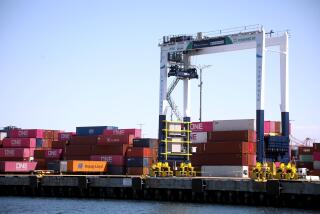There’s No Fuel Like a New Fuel
- Share via
One basic difference between a hydrogen system and other alternative vehicle-propulsion methods is that only hydrogen can replace our petroleum-based transportation/energy economy with a clean and truly renewable system (“The Last Best Hope of Earth,” by Alan Weisman, March 19).
Weisman didn’t happen to make note of an ongoing Southern California hydrogen project, a solar/hydrogen power-generating station, vehicle-fueling station and vehicle fleet in El Segundo that the 26-year-old environmental group Clean Air Now! has been operating for the past two years. It’s the country’s largest facility dedicated solely to fueling compressed-hydrogen and hydrogen-fuel-cell vehicles. And the Ballard Fuel Cell Bus that Weisman mentioned was carrying passengers recently on LAX’s parking lot loop and getting its fuel from the Clean Air Now facility.
W. Woodland Hastings
Santa Monica
*
Energy experts have been singing the praises of hydrogen as a fuel for 25 years or more, but there are substantial reasons, having nothing to do with greedy oil companies, why such visions are not materializing. No one knows how to build the photovoltaic systems that would deliver at affordable prices the energy needed to produce the hydrogen in the first place. And no one knows how to store the stuff for use in a car with enough range to make the package attractive.
T. A. Heppenheimer
Fountain Valley
*
Large-scale energy forecasting has a poor track record. In the 1850s, it was forecast that the world economy would soon grind to a halt because the supply of whale oil could not meet the demand. Later, at a time when experts were predicting mountains of manure in the streets of New York City by 1935, the automobile was hailed as the greatest-ever anti-pollution device. Then in the late ‘40s and early ‘50s, nuclear power was the environmentalists’ choice, because it was considered pollution-free, wouldn’t require the construction of dams and was so cheap that it wouldn’t even be worth metering.
The most feasible method of separating hydrogen and oxygen would be to use electricity generated by photovoltaic cells, an energy-intensive process that, because of its toxic byproducts, would be an immense source of pollution.
David Hilts
La Palma
*
Any type of energy source that could be converted to electricity could be used to produce hydrogen. Therefore, many nuclear-power proponents tend to promote hydrogen as well, because atomic-power plants could easily be coupled with hydrogen-generation facilities to produce automotive fuel. But remaining unsolved is the problems of pollution created by the power plant. Research dollars should be used to develop solar energy itself, rather than wasting them on the study of hydrogen.
Stephen Mills
Glendale
*
The one question that lurks in the minds of many at the leading edge: Is the world ready for the next great energy company to be Sparkletts?
Opher Banarie
Los Angeles
More to Read
Inside the business of entertainment
The Wide Shot brings you news, analysis and insights on everything from streaming wars to production — and what it all means for the future.
You may occasionally receive promotional content from the Los Angeles Times.










